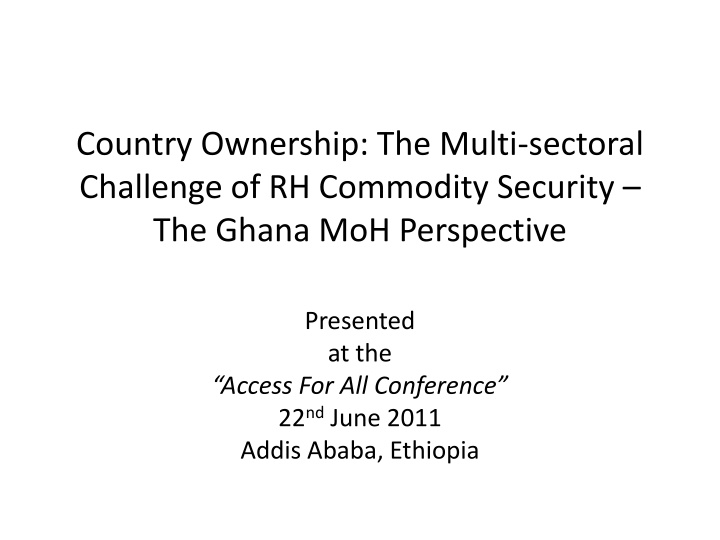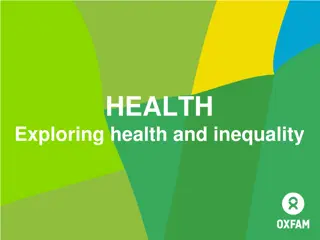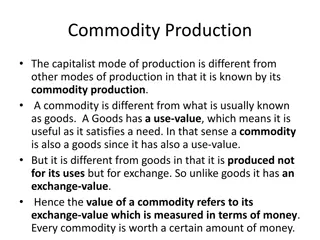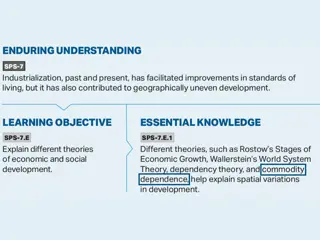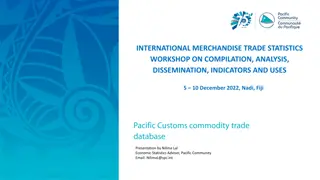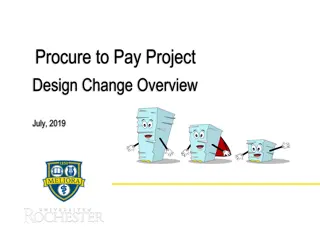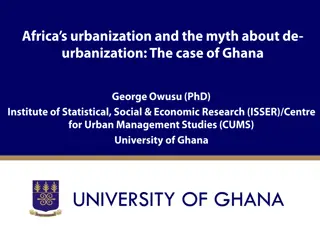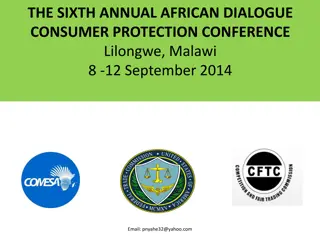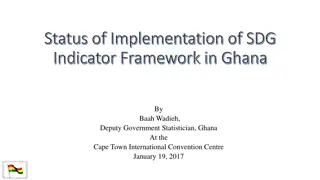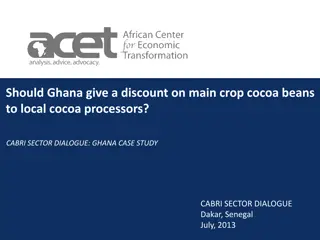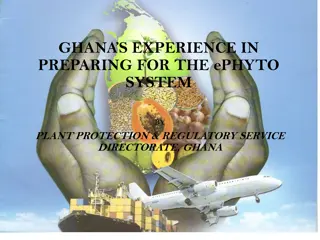Enhancing RH Commodity Security: Ghana MoH Perspective
Ghana's Ministry of Health (MoH) emphasizes country ownership in addressing the multi-sectoral challenges of reproductive health (RH) commodity security. The MoH highlights the importance of stakeholder involvement in national planning, coordination mechanisms, and strategic frameworks to improve maternal and child health outcomes. The Health Sector in Ghana focuses on creating wealth through health, with priorities on RH, nutrition, and lifestyle changes. The Ghana Health Service Strategic Framework aims to strengthen health systems for effective service delivery, particularly in maternal and child health.
Download Presentation

Please find below an Image/Link to download the presentation.
The content on the website is provided AS IS for your information and personal use only. It may not be sold, licensed, or shared on other websites without obtaining consent from the author.If you encounter any issues during the download, it is possible that the publisher has removed the file from their server.
You are allowed to download the files provided on this website for personal or commercial use, subject to the condition that they are used lawfully. All files are the property of their respective owners.
The content on the website is provided AS IS for your information and personal use only. It may not be sold, licensed, or shared on other websites without obtaining consent from the author.
E N D
Presentation Transcript
Country Ownership: The Multi-sectoral Challenge of RH Commodity Security The Ghana MoH Perspective Presented at the Access For All Conference 22ndJune 2011 Addis Ababa, Ethiopia
Country Ownership Session Objectives: What it means How different sectors working individually and together can overcome supply obstacles that confront countries. Ghana s Experience
Country Ownership MoH Perspective Having a national plan(s) to which all stakeholders have contributed and identify with (OWN) and which all support to implement, monitor and evaluate. Buy in Stakeholders include: Parliaments, Central and Local governments, Civil Society Organizations, Research Institutions, Media, and the Private Sector (Accra Declaration)
In Ghana There is a National Development Plan - PRSP (previous plans GPRS, Vision 2020) National Development Planning Commission Population and FP input by the National Population Council All sectors have Plans that are in line with the National Plan
Health Sector The Ministry of Health Health Policy Theme: Creating Wealth through Health Maternal and Child Health, Reproductive Health, Nutrition and Life Style Changes are among priorities Medium Term Health Strategy with 5-Yr Programs of Work 1997-2001, 2002 2006, 2007-2011
MoH Coordinating Mechanisms Health Partners Summit twice each year Aide Memoire signed with Development Partners In April 2008, Minister of Health declared Maternal Mortality as a national disaster at Health Summit Health Partners Coordinating Meetings monthly
Ghana Health Service Strategic Framework 2007-2011 Strengthening Health Systems for effective and efficient delivery of services to households and communities with a focus to improve maternal and child health outcomes Maternal & Child Health and RH among priorities RH Policies & Standards (1997) reviewed (2003) Service Protocols (Safe Motherhood, Family Planning, Comprehensive Abortion Care) Family Health Division
RH Policies and Standards documents and all other protocols (guidelines), strategic plans, road maps have been developed together with stakeholders and are being implemented, monitored and evaluated together. Government and MoH/GHS provides leadership cannot implement alone Calls for multi-sectoral response and Partnership Development partner support NGO, Civil Society Organizations, Community leaders .
. Strategic Planning Process GoG Policy Decision to Address CS Sogakope CS Workshop (May 2002) ICC/CS (August 2002) Core Technical Group (Oct. 2003) Ghana National Contraceptive Security Strategy (April 2004)
Commodity Security Contraceptive Commodity Security 2002 Inter Agency Coordinating Committee on Contraceptive Security (ICC/CS) Contraceptive Commodity Security Strategy (2004- 2010) RH Commodity Security Strategy (2011 2015) Road Map on Repositioning Family Planning Strategy (2005 2010)
Some Stakeholder Roles Role Agency(s) Activity Leadership MoH GHS Health Partners Summit Meetings, ICC/CS Coordination Development Partners, MOH Health Partners Meetings Policy MoH, GHS, Partners Policy Development, review, strategic plans, disseminate Commodity Registration Food and Drugs Board Advocacy NPC PPAG, UNFPA, USAID DELIVER, NPC, GHS, NGOs, CSOs (Population & FP on PRSP) Donorship to Ownership Meetings & Sessions with Parliamentarians, Documentaries, Traditional Leaders Capacity Building Technical Assistance USAID funded DELIVER GHS, Implementing Partners Forecasting Logistics Management Various Trainings
Some Stakeholder Roles Role Agency(s) Activity Service Delivery GHS, CHAG, NGOs R3M, PPAG, GRMA, CAs Service Delivery Partnerships MoH, GHS, IPs, PPAG, Social Marketing (EXP, GSMF), R3M Forecasting, Service Delivery, Advocacy and Resource Mobilization Financing USAID, UNFPA, DFID, World Bank, EU, DANIDA, Procurement Service Delivery M&E MoH, GHS, All Partners Monitoring Visits, Data Management, Meetings
Some Achievements Implementation of Contraceptive Security Strategy Development of Financial Sustainability Plan Vibrant ICC/CS Public-Private Partnerships e.g. Condoms to GSMF Service Delivery Updated Service Protocols (guidelines) Increase in Method Mix Introduction of New Methods R3M and other partners Advocacy: Inclusion of Contraceptives & new RH commodities on Essential Medicines List Donorship to Ownership Training in Standard Operating Procedures for Integrated LMIS Development of RH Commodity Security Strategy
General CS Challenges High Donor dependence for procurement Decreasing trend in GoG contribution towards procurement of contraceptives LMIS capacity not optimal resulting in stock-outs Multi-sectoral and Public private partnership sub-optimal No dedicated Funding to implement strategy Limited support for demand creation & sustainability e.g. IEC/BCC, training User fee pressure Information sharing and data capture among partners not optimal FP commodities not included in pro-poor schemes e.g. exemptions or NHIS which covers free maternal and child care
Closer Partnerships Improvement in information sharing, with capacity of Government built to improve coordination, capacity building and well- defined roles for all stakeholders, transparency, new and strategic partnerships with improved and coordinated resource mobilization, monitoring and evaluation.
Better Stakeholder Partnership There should be a shared vision and mission. Transparency, recognition and appreciation of each stakeholder s strengths, weaknesses, potential for improvement and roles Information sharing should be improved Stakeholders should present a common front Stop unhealthy competition for funding More of Constructive criticisms and suggestions for improvement
Way Forward Shared Commitment by all stakeholders Governments should demonstrate leadership, ownership and commitment by leading the development of all inclusive plans and strategies and by improving funding and other support. Development Partners should Buy In and support Government efforts.
Thank You for your interest ghana-flag Presented on behalf of the Ghana Team by Dr. Gloria J. Quansah Asare Director Family Health Division, GHS
